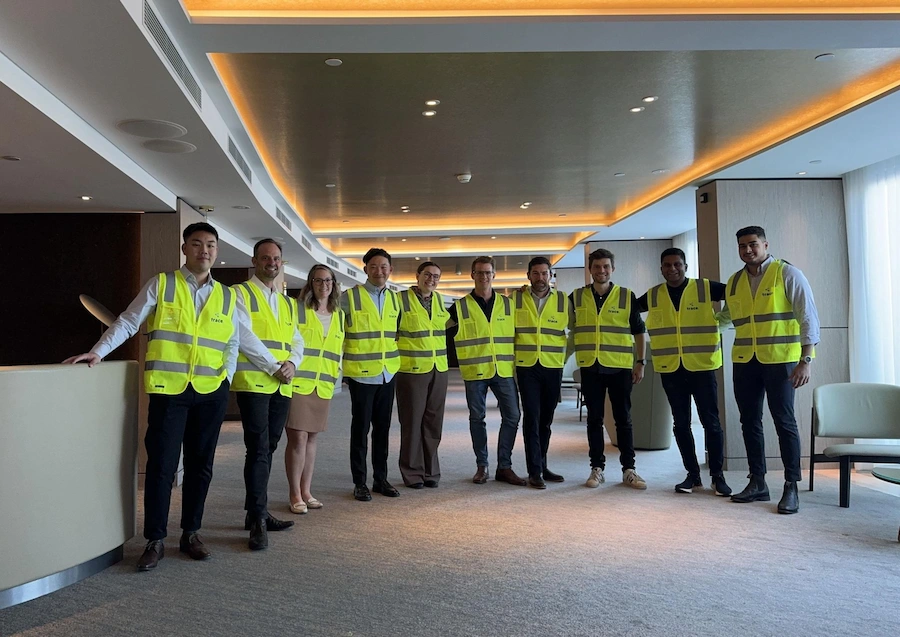Ready to turn insight into action?
We help organisations transform ideas into measurable results with strategies that work in the real world. Let’s talk about how we can solve your most complex supply chain challenges.

Sustainability has become a central focus for organisations worldwide, and those in Australia and New Zealand (ANZ) are no exception. As global pressure mounts to address environmental concerns and promote social responsibility, ANZ organisations in sectors such as retail, manufacturing, healthcare, government, fast-moving consumer goods (FMCG), and technology are increasingly recognising the importance of embedding sustainability into their supply chains.
One of the most effective ways to achieve this is through sustainability benchmarking. By measuring and comparing sustainability performance across supply chain operations, organisations can identify areas for improvement, set ambitious yet achievable goals, and track progress over time. This article delves into the importance of sustainability benchmarking across supply chains in ANZ, examining its benefits, the key areas to focus on, and how Trace Consultants can assist organisations on their journey toward greater sustainability.
The Importance of Sustainability Benchmarking
Sustainability benchmarking is the process of assessing an organisation’s environmental and social performance against established standards, industry best practices, or the performance of peers. It provides a clear picture of where an organisation stands in its sustainability efforts and highlights areas where improvements are needed.
For ANZ organisations, sustainability benchmarking is crucial for several reasons:
- Regulatory Compliance: Governments in Australia and New Zealand are implementing stricter environmental regulations, particularly around carbon emissions, waste management, and sustainable sourcing. Benchmarking helps organisations ensure they meet these regulatory requirements and avoid penalties.
- Consumer Expectations: Today’s consumers are increasingly environmentally conscious and prefer to buy from companies that demonstrate a commitment to sustainability. Benchmarking allows organisations to measure their sustainability efforts and communicate them effectively to consumers, enhancing brand reputation and customer loyalty.
- Cost Savings: Sustainability initiatives often lead to cost savings through improved efficiency, waste reduction, and energy conservation. Benchmarking helps organisations identify areas where these savings can be realised.
- Risk Management: Environmental and social risks can have significant financial and reputational impacts. Benchmarking helps organisations identify and mitigate these risks by ensuring that they adhere to best practices in sustainability.
- Competitive Advantage: Organisations that lead in sustainability can differentiate themselves in the marketplace. By benchmarking sustainability efforts, organisations can stay ahead of the competition and position themselves as industry leaders.
Key Areas of Sustainability Benchmarking in Supply Chains
Sustainability benchmarking can be applied across various aspects of the supply chain, from sourcing and procurement to production, distribution, and end-of-life management. Below, we explore the key areas where sustainability benchmarking can have the most significant impact.
1. Sustainable Sourcing and Procurement
Sustainable sourcing involves selecting suppliers and materials that minimise environmental impact and promote social responsibility. Benchmarking in this area can help organisations assess the sustainability of their sourcing practices, identify more sustainable suppliers, and ensure that procurement processes align with sustainability goals.
Key Metrics to Benchmark:
- Percentage of materials sourced from sustainable or certified sources.
- Supplier adherence to environmental and social responsibility standards.
- Reduction in the use of non-renewable resources.
- Implementation of ethical sourcing policies.
How Trace Consultants Can Help:Trace Consultants can assist ANZ organisations in developing and implementing sustainable sourcing strategies. Their experts can conduct a comprehensive benchmarking analysis to identify gaps in current sourcing practices, recommend sustainable suppliers, and help organisations establish robust procurement policies that prioritise sustainability.
2. Energy Efficiency and Carbon Footprint
Energy consumption and carbon emissions are critical areas of focus for sustainability efforts. Benchmarking energy efficiency and carbon footprint helps organisations measure their environmental impact and identify opportunities to reduce energy use and lower emissions.
Key Metrics to Benchmark:
- Total energy consumption across the supply chain.
- Carbon emissions per unit of production or per shipment.
- Percentage of energy from renewable sources.
- Reduction in greenhouse gas emissions over time.
How Trace Consultants Can Help:Trace Consultants provides expert guidance on reducing energy consumption and carbon emissions in supply chain operations. They can benchmark an organisation’s current energy use and carbon footprint against industry standards and best practices, and develop strategies to improve energy efficiency, transition to renewable energy sources, and reduce overall emissions.
3. Waste Management and Circular Economy
Effective waste management and the adoption of circular economy principles are essential for minimising environmental impact. Sustainability benchmarking in waste management involves assessing how well an organisation is reducing, reusing, and recycling waste, and how it can move towards a more circular supply chain.
Key Metrics to Benchmark:
- Waste generation per unit of production.
- Percentage of waste recycled or reused.
- Implementation of circular economy practices, such as product take-back schemes.
- Reduction in landfill use and hazardous waste.
How Trace Consultants Can Help:Trace Consultants can help ANZ organisations optimise their waste management practices and adopt circular economy principles. Their team can benchmark current waste management efforts, identify areas for improvement, and develop strategies to reduce waste, increase recycling, and integrate circular economy concepts into the supply chain.
4. Water Use and Management
Water is a critical resource, and managing its use efficiently is an important aspect of sustainability. Benchmarking water use and management helps organisations understand their water footprint and identify ways to reduce water consumption and improve water quality management.
Key Metrics to Benchmark:
- Total water consumption across the supply chain.
- Water use efficiency (e.g., water used per unit of production).
- Implementation of water recycling and conservation practices.
- Reduction in water pollution and improvement in wastewater management.
How Trace Consultants Can Help:Trace Consultants can assist organisations in benchmarking their water use and management practices. They can help identify opportunities to reduce water consumption, improve water use efficiency, and implement water recycling and conservation initiatives. This can lead to significant environmental benefits and cost savings.
5. Ethical Labour Practices and Social Responsibility
Sustainability is not just about environmental impact; it also encompasses social responsibility, particularly in terms of labour practices. Benchmarking ethical labour practices involves assessing how well an organisation’s supply chain adheres to fair labour standards, including safe working conditions, fair wages, and the prevention of forced or child labour.
Key Metrics to Benchmark:
- Supplier adherence to ethical labour standards.
- Implementation of fair wage policies.
- Reduction in workplace accidents and injuries.
- Engagement in community development and social responsibility initiatives.
How Trace Consultants Can Help:Trace Consultants can help ANZ organisations benchmark their ethical labour practices and social responsibility efforts. They offer guidance on developing and implementing policies that ensure fair and safe working conditions throughout the supply chain. Additionally, Trace Consultants can assist in setting up monitoring and reporting mechanisms to track compliance with ethical standards.
Sector-Specific Considerations for Sustainability Benchmarking
While the principles of sustainability benchmarking apply across all industries, each sector has its own unique challenges and considerations. Below, we explore sector-specific considerations for sustainability benchmarking in key industries across ANZ.
Retail Sector
In the retail sector, sustainability benchmarking is essential for managing the environmental and social impacts of a global supply chain. Retailers must focus on sustainable sourcing, reducing carbon emissions from logistics, and minimising waste, particularly from packaging. Key areas of benchmarking may include the sustainability of product sourcing, energy efficiency in distribution centers, and the effectiveness of waste reduction initiatives.
Manufacturing Sector
Manufacturing is often resource-intensive, making sustainability benchmarking crucial for improving energy efficiency, reducing emissions, and minimising waste. Manufacturers must benchmark their environmental impact at every stage of production, from sourcing raw materials to manufacturing processes and distribution. Key areas of focus may include energy use, water management, and waste reduction in production facilities.
Healthcare Sector
The healthcare sector has unique sustainability challenges, including the need to manage hazardous waste and ensure the safe disposal of medical products. Benchmarking in this sector may focus on reducing the environmental impact of healthcare facilities, improving energy efficiency, and managing waste effectively. Key metrics may include energy consumption, water use, and the effectiveness of waste management practices.
Government Sector
Government agencies play a significant role in promoting sustainability, both through their own operations and by setting regulatory standards. Benchmarking in the government sector may focus on energy use in public buildings, sustainable procurement practices, and the effectiveness of policies aimed at reducing carbon emissions and promoting social responsibility. Key areas of benchmarking may include the sustainability of government procurement, energy efficiency in public facilities, and the implementation of green initiatives.
FMCG Sector
The FMCG sector is characterised by high volumes and rapid turnover, making sustainability benchmarking essential for reducing the environmental impact of production and distribution. FMCG companies must focus on sustainable sourcing, reducing packaging waste, and minimising carbon emissions from logistics. Key areas of benchmarking may include the sustainability of raw materials, the efficiency of production processes, and the effectiveness of waste reduction initiatives.
Technology Sector
The technology sector often involves complex, global supply chains with significant environmental and social impacts. Sustainability benchmarking in this sector may focus on the responsible sourcing of raw materials, reducing energy use in production, and managing electronic waste. Key areas of benchmarking may include the sustainability of raw material sourcing, energy efficiency in manufacturing, and the implementation of e-waste recycling programs.
The Role of Technology in Sustainability Benchmarking
Technology plays a critical role in enabling effective sustainability benchmarking. Advanced analytics, data management systems, and sustainability reporting tools provide organisations with the data and insights needed to conduct accurate benchmarking analyses.
Data Collection and Management
Modern sustainability reporting tools can automate the collection of data across various supply chain functions, ensuring that organisations have access to accurate and timely information. These systems can integrate data from multiple sources, such as enterprise resource planning (ERP) systems, warehouse management systems (WMS), transport management systems (TMS), and environmental monitoring tools. By consolidating this data, organisations can gain a comprehensive view of their sustainability performance across the entire supply chain.
Advanced Analytics for Sustainability Insights
Advanced analytics tools can process large volumes of data to uncover trends, patterns, and inefficiencies in sustainability practices. These tools can also generate predictive insights, helping organisations anticipate future challenges and opportunities in their sustainability efforts. For example, predictive analytics can identify potential areas where energy consumption might increase, allowing organisations to take proactive steps to mitigate their environmental impact.
Real-Time Monitoring and Reporting
Real-time monitoring tools enable organisations to track sustainability performance as it happens, allowing for immediate identification of issues such as excessive energy use, waste generation, or non-compliance with environmental standards. Real-time data also supports dynamic benchmarking, where organisations continuously compare their sustainability performance against live benchmarks and adjust their strategies as needed.
Sustainability Benchmarking Platforms
Specialised sustainability benchmarking platforms aggregate data from multiple organisations and industries, providing a broader context for performance comparison. These platforms enable organisations to benchmark their sustainability efforts against a diverse set of peers, offering deeper insights into how they measure up against industry leaders and best practices.
Case Studies: Success Stories in Sustainability Benchmarking with Trace Consultants
To illustrate the impact of sustainability benchmarking, let’s explore a few case studies where Trace Consultants has helped ANZ organisations achieve significant improvements in their sustainability performance.
Case Study 1: Reducing Carbon Footprint for a Manufacturing Giant
A major manufacturing company in New Zealand was facing challenges in reducing its carbon footprint due to high energy consumption and outdated production processes. Trace Consultants conducted a comprehensive sustainability benchmarking analysis, comparing the company’s energy use and carbon emissions against industry best practices.
The analysis revealed that the company’s reliance on non-renewable energy sources was a major contributor to its high carbon emissions. Trace Consultants recommended the implementation of energy-efficient technologies and the transition to renewable energy sources, such as solar and wind power. Additionally, they advised on optimizing production processes to reduce energy waste.
As a result, the company achieved a 25% reduction in its carbon footprint within two years, aligning with its sustainability goals and enhancing its reputation as an environmentally responsible manufacturer.
Case Study 2: Enhancing Waste Management in the FMCG Sector
A leading FMCG company in Australia was struggling with high levels of waste generated during the production and distribution of its products. Trace Consultants conducted a benchmarking analysis of the company’s waste management practices, comparing them against best-in-class practices in the industry.
The analysis identified several areas for improvement, including the need for better recycling programs, more efficient packaging design, and the adoption of circular economy principles. Trace Consultants recommended a comprehensive waste reduction strategy, including the introduction of product take-back schemes, the use of biodegradable packaging, and the implementation of zero-waste-to-landfill initiatives.
Following the implementation of these recommendations, the company reduced its waste by 30% and significantly increased its recycling rate. These improvements not only reduced the environmental impact of the company’s operations but also resulted in cost savings and enhanced brand loyalty among environmentally conscious consumers.
Case Study 3: Promoting Ethical Labour Practices in the Technology Sector
A technology company with a global supply chain was under scrutiny for its labour practices, particularly concerning the sourcing of raw materials from regions with poor labour standards. Trace Consultants conducted a benchmarking analysis of the company’s ethical labour practices, comparing them against international standards and the performance of industry leaders.
The analysis revealed gaps in the company’s supplier monitoring processes and a lack of transparency in its sourcing practices. Trace Consultants recommended the implementation of a comprehensive supplier code of conduct, regular audits of supplier practices, and increased collaboration with non-governmental organisations (NGOs) to improve labour conditions in high-risk regions.
As a result, the company strengthened its commitment to ethical labour practices, improved working conditions across its supply chain, and enhanced its corporate social responsibility (CSR) profile. These changes not only mitigated reputational risks but also positioned the company as a leader in ethical sourcing within the technology sector.
The Future of Sustainability Benchmarking in ANZ
As sustainability continues to gain importance on the global stage, sustainability benchmarking will become an increasingly vital tool for ANZ organisations. The evolving regulatory landscape, growing consumer demand for sustainable products, and the increasing importance of environmental, social, and governance (ESG) criteria will drive organisations to enhance their sustainability efforts.
Technology will play a key role in the future of sustainability benchmarking. Innovations in data analytics, artificial intelligence, and blockchain will provide organisations with more accurate and transparent ways to measure and report on their sustainability performance. These technologies will enable more sophisticated benchmarking analyses, allowing organisations to set more ambitious sustainability goals and track their progress in real time.
Moreover, as the focus on sustainability expands beyond environmental impact to include social responsibility and ethical governance, organisations will need to benchmark a broader range of sustainability metrics. This holistic approach to sustainability benchmarking will ensure that organisations not only meet regulatory requirements but also contribute positively to the communities in which they operate.
Partnering with Trace Consultants for Sustainability Excellence
Sustainability benchmarking is a powerful tool that can help ANZ organisations achieve significant improvements in their environmental and social performance. By measuring their sustainability efforts against industry standards and best practices, organisations can identify areas for improvement, set meaningful goals, and track their progress over time.
Trace Consultants, with its deep expertise in sustainability and supply chain management, is uniquely positioned to help ANZ organisations implement effective sustainability benchmarking strategies. Whether in sustainable sourcing, energy efficiency, waste management, water conservation, or ethical labour practices, Trace Consultants offers comprehensive services that deliver measurable results.
As the business landscape continues to evolve, partnering with a trusted advisor like Trace Consultants will be key to staying ahead of the competition and achieving long-term success in sustainability. With their guidance, ANZ organisations can unlock the full potential of their supply chains, ensuring that they are not only efficient and cost-effective but also sustainable, socially responsible, and future-ready.
Ready to turn insight into action?
We help organisations transform ideas into measurable results with strategies that work in the real world. Let’s talk about how we can solve your most complex supply chain challenges.









